人教版高中英语必修四Unit4 Body Language Period 3 extensive reading课件(26张PPT)
文档属性
| 名称 | 人教版高中英语必修四Unit4 Body Language Period 3 extensive reading课件(26张PPT) | 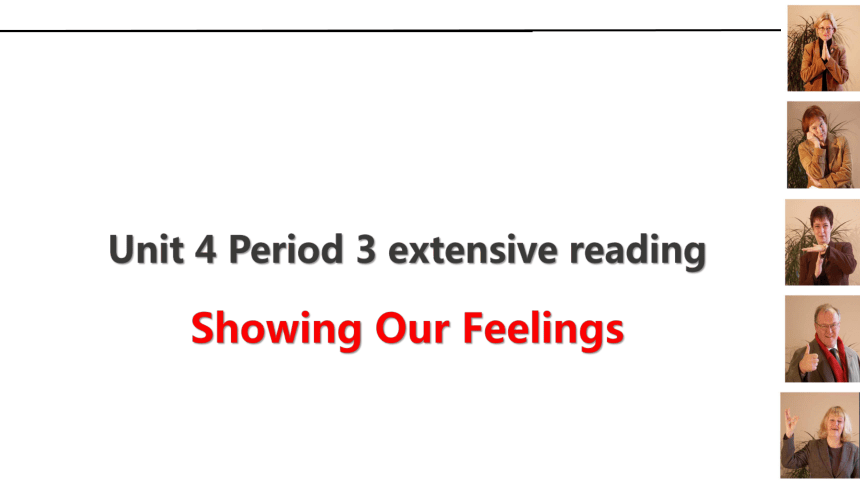 | |
| 格式 | zip | ||
| 文件大小 | 4.2MB | ||
| 资源类型 | 教案 | ||
| 版本资源 | 人教版(新课程标准) | ||
| 科目 | 英语 | ||
| 更新时间 | 2020-05-11 22:01:21 | ||
图片预览

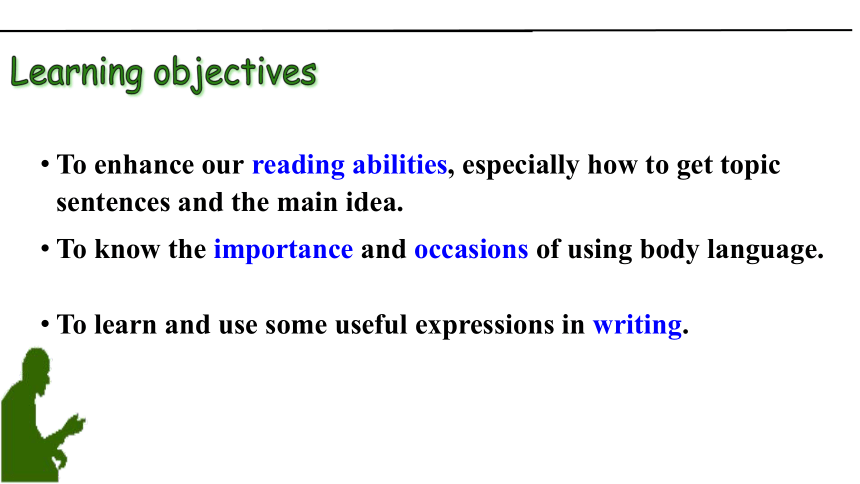
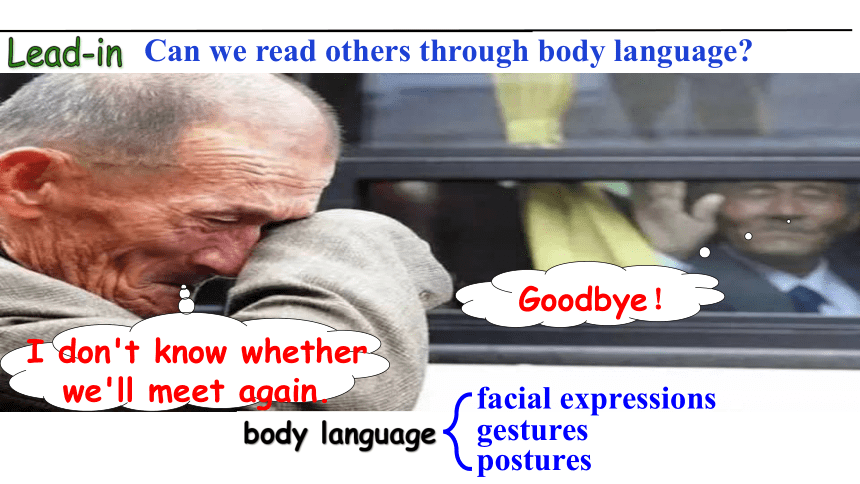


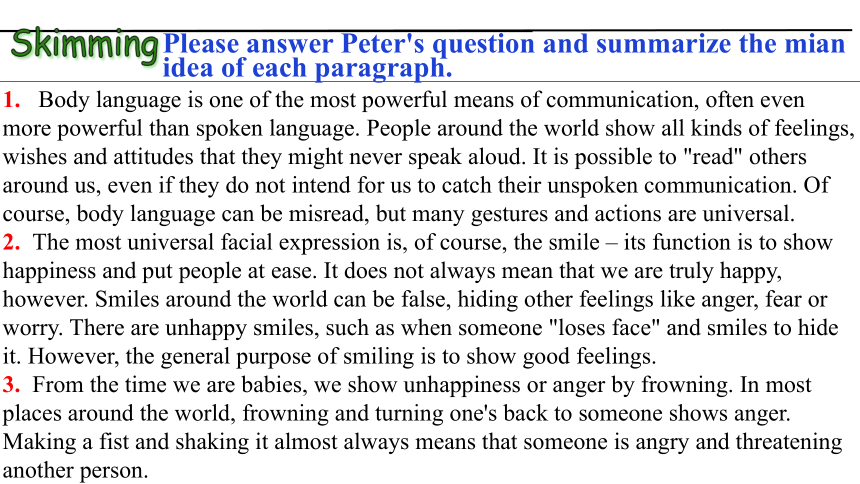
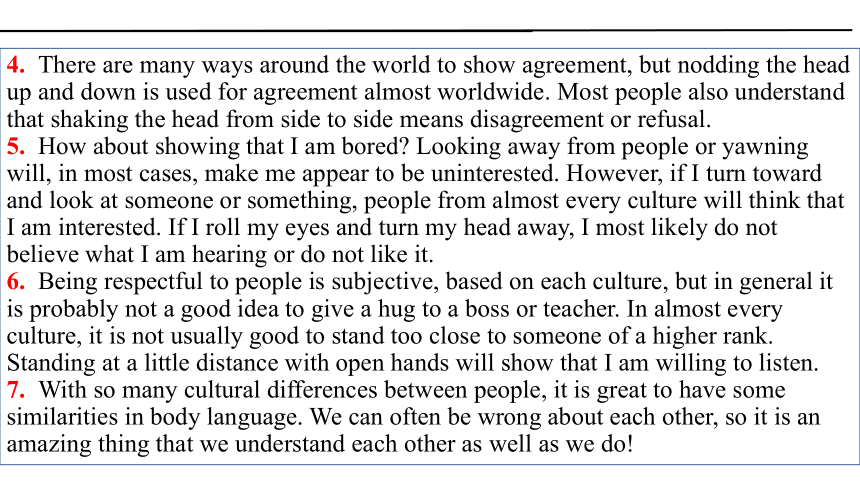
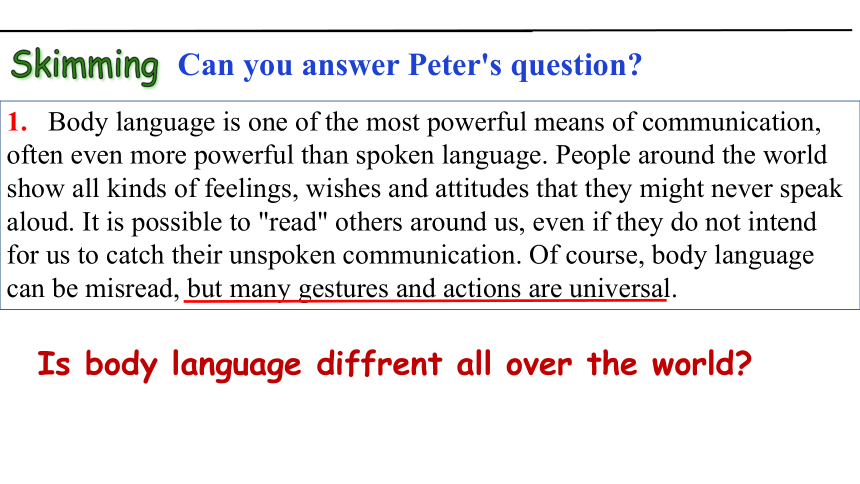
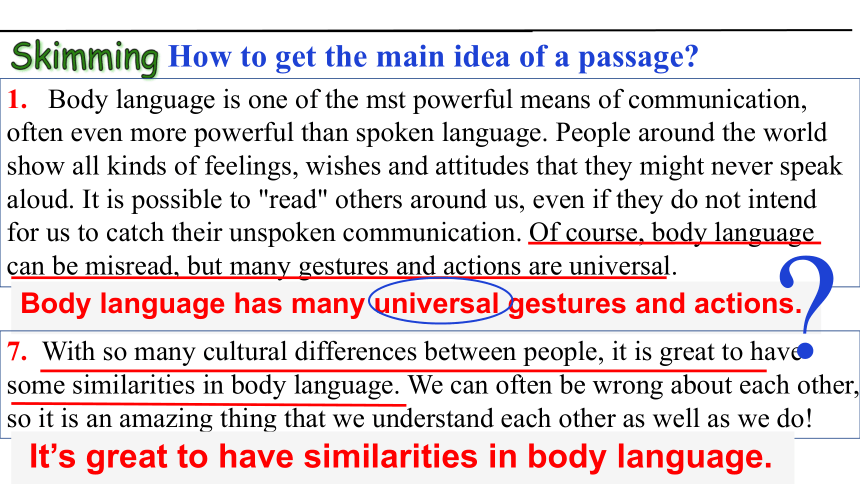
文档简介
(共26张PPT)
Unit 4 Period 3 extensive reading
Showing Our Feelings
To enhance our reading abilities, especially how to get topic sentences and the main idea.
To know the importance and occasions of using body language.
To learn and use some useful expressions in writing.
Learning objectives
Goodbye!
I don't know whether we'll meet again.
facial expressions
gestures
postures
body language
Lead-in
Can we read others through body language?
Dear Elen,
Recently we have been learning body language. I find the class interesting, but I'm still puzzled about my past experience in India.
Last year when I went travelling in India, I offered to hug my Indian teacher. You know what happened? He closed his palms and bowed. I was quite shocked and sad. Did I misunderstand his body language?
Is body language different in different countries?
Looking forward to your reply. Yours,
Peter
What's Peter's problem?
Showing Our Feelings
P30
Skimming
1. Body language is one of the most powerful means of communication, often even more powerful than spoken language. People around the world show all kinds of feelings, wishes and attitudes that they might never speak aloud. It is possible to "read" others around us, even if they do not intend for us to catch their unspoken communication. Of course, body language can be misread, but many gestures and actions are universal.
2. The most universal facial expression is, of course, the smile – its function is to show happiness and put people at ease. It does not always mean that we are truly happy, however. Smiles around the world can be false, hiding other feelings like anger, fear or worry. There are unhappy smiles, such as when someone "loses face" and smiles to hide it. However, the general purpose of smiling is to show good feelings.
3. From the time we are babies, we show unhappiness or anger by frowning. In most places around the world, frowning and turning one's back to someone shows anger. Making a fist and shaking it almost always means that someone is angry and threatening another person.
Please answer Peter's question and summarize the mian idea of each paragraph.
4. There are many ways around the world to show agreement, but nodding the head up and down is used for agreement almost worldwide. Most people also understand that shaking the head from side to side means disagreement or refusal.
5. How about showing that I am bored? Looking away from people or yawning will, in most cases, make me appear to be uninterested. However, if I turn toward and look at someone or something, people from almost every culture will think that I am interested. If I roll my eyes and turn my head away, I most likely do not believe what I am hearing or do not like it.
6. Being respectful to people is subjective, based on each culture, but in general it is probably not a good idea to give a hug to a boss or teacher. In almost every culture, it is not usually good to stand too close to someone of a higher rank. Standing at a little distance with open hands will show that I am willing to listen.
7. With so many cultural differences between people, it is great to have some similarities in body language. We can often be wrong about each other, so it is an amazing thing that we understand each other as well as we do!
Skimming
1. Body language is one of the most powerful means of communication, often even more powerful than spoken language. People around the world show all kinds of feelings, wishes and attitudes that they might never speak aloud. It is possible to "read" others around us, even if they do not intend for us to catch their unspoken communication. Of course, body language can be misread, but many gestures and actions are universal.
Can you answer Peter's question?
Is body language diffrent all over the world?
Skimming
How to get the main idea of a passage?
1. Body language is one of the mst powerful means of communication, often even more powerful than spoken language. People around the world show all kinds of feelings, wishes and attitudes that they might never speak aloud. It is possible to "read" others around us, even if they do not intend for us to catch their unspoken communication. Of course, body language can be misread, but many gestures and actions are universal.
Body language has many universal gestures and actions.
7. With so many cultural differences between people, it is great to have some similarities in body language. We can often be wrong about each other, so it is an amazing thing that we understand each other as well as we do!
It’s great to have similarities in body language.
?
Skimming
Summarize the main idea of Para 2-6 .
2. The most universal facial expression is, of course, the smile – its function is to show happiness and put people at ease. It does not always mean that we are truly happy, however. Smiles around the world can be false, hiding other feelings like anger, fear or worry. There are unhappy smiles, such as when someone "loses face" and smiles to hide it. However, the general purpose of smiling is to show good feelings.
showing happiness
3. From the time we are babies, we show unhappiness or anger by frowning. In most places around the world, frowning and turning one's back to someone shows anger. Making a fist and shaking it almost always means that someone is angry and threatening another person.
showing unhappiness or anger
4. There are many ways around the world to show agreement, but nodding the head up and down is used for agreement, almost worldwide. Most people also understand that shaking the head from side to side means disagreement or refusal.
5. How about showing that I am bored? Looking away from people or yawning will, in most cases, make me appear to be uninterested. However, if I turn toward and look at someone or something, people from almost every culture will think that I am interested. If I roll my eyes and turn my head away, I most likely do not believe what I am hearing or do not like it.
showing agreement or disagreement
showing boredom
6. Being respectful to people is subjective, based on each culture, but in general it is probably not a good idea to give a hug to a boss or teacher. In almost every culture, it is not usually good to stand too close to someone of a higher rank. Standing at a little distance with open hands will show that I am willing to listen.
showing respect
para1: Body language has many universal gestures and actions.
para2: Showing happiness
para3: Showing unhappiness or anger
para4: Showing agreement or disagreement
para5: Showing boredom
para6: Showing respect
para7: It's great to have similarities in body language.
Divide the passage into three parts.
Skimming
Part 1
Part 2
Part 3
Careful reading Para 1
1. Body language is one of the most powerful means of communication, often even more powerful than spoken language. People around the world show all kinds of feelings, wishes and attitudes that they might never speak aloud. It is possible to "read" others around us, even if they do not intend for us to catch their unspoken communication. Of course, body language can be misread, but many gestures and actions are universal.
How can we show our feelings?
spoken language; body language
How to infer the meaning of words?
Infer the meaning from the context(语境).
Infer from word-formation(构词法).
mis-
mislead; mistake; mismatch
means of communication 交流方式
spoken language口头语言
even if 即使
intend for sb to do打算让某人做
2. The most universal facial expression is, of course, the smile – its function is to show happiness and put people at ease. It does not always mean that we are truly happy, however. Smiles around the world can be false, hiding other feelings like anger, fear or worry. There are unhappy smiles, such as when someone "loses face" and smiles to hide it. However, the general purpose of smiling is to show good feelings.
facial expression面部表情
put sb at ease让某人放松
lose face 丢脸
What's the most universal facial expression and its function?
Smile.
To show happiness and put people at ease.
Our plan is ______(make) better use of these materials.
His wish is _______ (study) in a key university in the future.
Its function is to show happiness and put people at ease.
The general purpose of smiling is to show good feelings.
不定式作表语
主语是以aim, ambition, hope, intention, plan, purpose, wish等为中心词的名词词组,后面用不定式作表语说明其内容.
to make
to study
Learn and practise
3. From the time we are babies, we show unhappiness or anger by frowning. In most places around the world, frowning and turning one's back to someone shows anger. Making a fist and shaking it almost always means that someone is angry and threatening another person.
4. There are many ways around the world to show agreement, but nodding the head up and down is used for agreement, almost worldwide. Most people also understand that shaking the head from side to side means disagreement or refusal.
turn one’s back to背对;背弃
make a fist握拳
nod the head up and down上下点头
shake the head from side to side左右摇头
How to show unhappiness or anger?
How to show agreement or disagrement?
5. How about showing that I am bored? Looking away from people or yawning will, in most cases, make me appear to be uninterested. However, if I turn toward and look at someone or something, people from almost every culture will think that I am interested. If I roll my eyes and turn my head away, I most likely do not believe what I am hearing or do not like it.
6. Being respectful to people is subjective, based on each culture, but in general it is probably not a good idea to give a hug to a boss or teacher. In almost every culture, it is not usually good to stand too close to someone of a higher rank. Standing at a little distance with open hands will show that I am willing to listen.
look away from把眼光从...移开
in most cases在大部分情况下
turn toward/to sb转向某人
turn the head away 把头扭开
most likely相当于It is most likely that
How to show boredom?
How to show respect?
subjective 主观的
be respectful to sb 尊重某人
give a hug to拥抱
of a higher rank更高等级的
at a little distance隔一点距离
be willing to do愿意做
Looking away from people or yawning will, in most cases, make me appear to be uninterested.
Being respectful to people is subjective...
动名词作主语
Learn and practise
_______(read) English out loud it a good habbit.
It is a waste of time _________(persuade) such a person to join us.
动名词作主语一般表示经常性、习惯性的动作,有时用it做形式主语,常见的有It is no use/no good/a waste of time doing sth.
Reading
persuading
7. With so many cultural differences between people, it is great to have some similarities in body language. We can often be wrong about each other, so it is an amazing thing that we understand each other as well as we do!
be wrong about 误解;搞错
Why is having similarities in body language great?
(With+宾语+宾补)
介词短语
?
Learn and practise
With his first shot a failure, Tom fired again.
The children were listening to the teacher with their eyes open.
The proud girl walked away with her head up.
Mary felt very shy with so many eyes looking at her.
If you sit with your back turned, you are not interested in that person.
With too much work to do the next day, he felt anxious and didn't sleep well.
With 的复合结构
是独立主格结构的一种,在句中表示“原因,结果,伴随,方式”等情况。
n.
adj.
adv.
doing
表主动
done
表被动
to do
表将要
Learn and practise
He came in with a book __________(手里拿着一本书).
The old man fell asleep with the light __(灯开着).
3.With many things ____(do), I can't go on holiday.
4.He becomes stronger with time _____(go) by.
5.With everything ________(prepare), he will surely succeed.
in his hand
on
going
to do
prepared
Body language is the same all over the world.
Few gestures and actions are universal.
It is respectful to give a hug to a boss or teacher.
Body language shows all kinds of feelings and attitudes.
We'd better watch as well as listen to others.
not
Comprehension
not always
Many
Can we reply to Peter's letter?
But fortunately,
For instance,
Because
Dear Peter,
Glad to hear from you. As for what troubles you in your letter, I'd like to say something concerning it.
Generally speaking,______________________________. ______________. But fortunately,____________________ . ___________.For example, _________________________
____________ .
______________________________________________
________________________________________________
My advice is: _________________________________ Yours, Elen
不定式作表语
动名词作主语
with复合结构
body language is not always the same
all over the world
many gestures and actions
are universal
it is not respectful to give a hug to
boss or teacher
As body language shows all kinds of feelings and attitudes, we'd better watch as well as listen to others.
Polish the writing
Do as the Romans do. It is the best policy.
Polish the writing
1. It is not respectful to give a hug to a boss or teacher. (动名词做主语)
___________________________is not respectful.
It is no good __________________________.
2. As body language shows all kinds of feelings and attitudes, we'd better watch as well as listen to others. (with复合结构)
__________________________________________________, we'd better watch as well as listen to others.
3. Do as the Romans do. It is the best policy. (不定式作表语)
______________________ is the best policy.
Giving a hug to a boss or teacher
Doing as the Romans do
giving a hug to a boss or teacher
With body language showing all kinds of feelings and attitudes
Dear Peter,
Glad to hear from you. As for what troubles you in your letter, I'd like to say something concerning it.
Generally speaking,______________________________. ______________. But fortunately,____________________ . ___________.For example, _________________________
____________ .
______________________________________________
_________________________________________
My advice is: __________________________________ Yours, Elen
body language is not always the same
all over the world
many gestures and actions
are universal
With body language showing all kinds of feelings and attitudes, we'd better watch as well as listen to others.
it is no good giving a hug to a
a boss or teacher
Doing as the Romans do is the best policy.
cultural crossroads
Please finsh a wiriting about how to face the cultural shock using what we learned today.
Finish related exercises.
Homework
Unit 4 Period 3 extensive reading
Showing Our Feelings
To enhance our reading abilities, especially how to get topic sentences and the main idea.
To know the importance and occasions of using body language.
To learn and use some useful expressions in writing.
Learning objectives
Goodbye!
I don't know whether we'll meet again.
facial expressions
gestures
postures
body language
Lead-in
Can we read others through body language?
Dear Elen,
Recently we have been learning body language. I find the class interesting, but I'm still puzzled about my past experience in India.
Last year when I went travelling in India, I offered to hug my Indian teacher. You know what happened? He closed his palms and bowed. I was quite shocked and sad. Did I misunderstand his body language?
Is body language different in different countries?
Looking forward to your reply. Yours,
Peter
What's Peter's problem?
Showing Our Feelings
P30
Skimming
1. Body language is one of the most powerful means of communication, often even more powerful than spoken language. People around the world show all kinds of feelings, wishes and attitudes that they might never speak aloud. It is possible to "read" others around us, even if they do not intend for us to catch their unspoken communication. Of course, body language can be misread, but many gestures and actions are universal.
2. The most universal facial expression is, of course, the smile – its function is to show happiness and put people at ease. It does not always mean that we are truly happy, however. Smiles around the world can be false, hiding other feelings like anger, fear or worry. There are unhappy smiles, such as when someone "loses face" and smiles to hide it. However, the general purpose of smiling is to show good feelings.
3. From the time we are babies, we show unhappiness or anger by frowning. In most places around the world, frowning and turning one's back to someone shows anger. Making a fist and shaking it almost always means that someone is angry and threatening another person.
Please answer Peter's question and summarize the mian idea of each paragraph.
4. There are many ways around the world to show agreement, but nodding the head up and down is used for agreement almost worldwide. Most people also understand that shaking the head from side to side means disagreement or refusal.
5. How about showing that I am bored? Looking away from people or yawning will, in most cases, make me appear to be uninterested. However, if I turn toward and look at someone or something, people from almost every culture will think that I am interested. If I roll my eyes and turn my head away, I most likely do not believe what I am hearing or do not like it.
6. Being respectful to people is subjective, based on each culture, but in general it is probably not a good idea to give a hug to a boss or teacher. In almost every culture, it is not usually good to stand too close to someone of a higher rank. Standing at a little distance with open hands will show that I am willing to listen.
7. With so many cultural differences between people, it is great to have some similarities in body language. We can often be wrong about each other, so it is an amazing thing that we understand each other as well as we do!
Skimming
1. Body language is one of the most powerful means of communication, often even more powerful than spoken language. People around the world show all kinds of feelings, wishes and attitudes that they might never speak aloud. It is possible to "read" others around us, even if they do not intend for us to catch their unspoken communication. Of course, body language can be misread, but many gestures and actions are universal.
Can you answer Peter's question?
Is body language diffrent all over the world?
Skimming
How to get the main idea of a passage?
1. Body language is one of the mst powerful means of communication, often even more powerful than spoken language. People around the world show all kinds of feelings, wishes and attitudes that they might never speak aloud. It is possible to "read" others around us, even if they do not intend for us to catch their unspoken communication. Of course, body language can be misread, but many gestures and actions are universal.
Body language has many universal gestures and actions.
7. With so many cultural differences between people, it is great to have some similarities in body language. We can often be wrong about each other, so it is an amazing thing that we understand each other as well as we do!
It’s great to have similarities in body language.
?
Skimming
Summarize the main idea of Para 2-6 .
2. The most universal facial expression is, of course, the smile – its function is to show happiness and put people at ease. It does not always mean that we are truly happy, however. Smiles around the world can be false, hiding other feelings like anger, fear or worry. There are unhappy smiles, such as when someone "loses face" and smiles to hide it. However, the general purpose of smiling is to show good feelings.
showing happiness
3. From the time we are babies, we show unhappiness or anger by frowning. In most places around the world, frowning and turning one's back to someone shows anger. Making a fist and shaking it almost always means that someone is angry and threatening another person.
showing unhappiness or anger
4. There are many ways around the world to show agreement, but nodding the head up and down is used for agreement, almost worldwide. Most people also understand that shaking the head from side to side means disagreement or refusal.
5. How about showing that I am bored? Looking away from people or yawning will, in most cases, make me appear to be uninterested. However, if I turn toward and look at someone or something, people from almost every culture will think that I am interested. If I roll my eyes and turn my head away, I most likely do not believe what I am hearing or do not like it.
showing agreement or disagreement
showing boredom
6. Being respectful to people is subjective, based on each culture, but in general it is probably not a good idea to give a hug to a boss or teacher. In almost every culture, it is not usually good to stand too close to someone of a higher rank. Standing at a little distance with open hands will show that I am willing to listen.
showing respect
para1: Body language has many universal gestures and actions.
para2: Showing happiness
para3: Showing unhappiness or anger
para4: Showing agreement or disagreement
para5: Showing boredom
para6: Showing respect
para7: It's great to have similarities in body language.
Divide the passage into three parts.
Skimming
Part 1
Part 2
Part 3
Careful reading Para 1
1. Body language is one of the most powerful means of communication, often even more powerful than spoken language. People around the world show all kinds of feelings, wishes and attitudes that they might never speak aloud. It is possible to "read" others around us, even if they do not intend for us to catch their unspoken communication. Of course, body language can be misread, but many gestures and actions are universal.
How can we show our feelings?
spoken language; body language
How to infer the meaning of words?
Infer the meaning from the context(语境).
Infer from word-formation(构词法).
mis-
mislead; mistake; mismatch
means of communication 交流方式
spoken language口头语言
even if 即使
intend for sb to do打算让某人做
2. The most universal facial expression is, of course, the smile – its function is to show happiness and put people at ease. It does not always mean that we are truly happy, however. Smiles around the world can be false, hiding other feelings like anger, fear or worry. There are unhappy smiles, such as when someone "loses face" and smiles to hide it. However, the general purpose of smiling is to show good feelings.
facial expression面部表情
put sb at ease让某人放松
lose face 丢脸
What's the most universal facial expression and its function?
Smile.
To show happiness and put people at ease.
Our plan is ______(make) better use of these materials.
His wish is _______ (study) in a key university in the future.
Its function is to show happiness and put people at ease.
The general purpose of smiling is to show good feelings.
不定式作表语
主语是以aim, ambition, hope, intention, plan, purpose, wish等为中心词的名词词组,后面用不定式作表语说明其内容.
to make
to study
Learn and practise
3. From the time we are babies, we show unhappiness or anger by frowning. In most places around the world, frowning and turning one's back to someone shows anger. Making a fist and shaking it almost always means that someone is angry and threatening another person.
4. There are many ways around the world to show agreement, but nodding the head up and down is used for agreement, almost worldwide. Most people also understand that shaking the head from side to side means disagreement or refusal.
turn one’s back to背对;背弃
make a fist握拳
nod the head up and down上下点头
shake the head from side to side左右摇头
How to show unhappiness or anger?
How to show agreement or disagrement?
5. How about showing that I am bored? Looking away from people or yawning will, in most cases, make me appear to be uninterested. However, if I turn toward and look at someone or something, people from almost every culture will think that I am interested. If I roll my eyes and turn my head away, I most likely do not believe what I am hearing or do not like it.
6. Being respectful to people is subjective, based on each culture, but in general it is probably not a good idea to give a hug to a boss or teacher. In almost every culture, it is not usually good to stand too close to someone of a higher rank. Standing at a little distance with open hands will show that I am willing to listen.
look away from把眼光从...移开
in most cases在大部分情况下
turn toward/to sb转向某人
turn the head away 把头扭开
most likely相当于It is most likely that
How to show boredom?
How to show respect?
subjective 主观的
be respectful to sb 尊重某人
give a hug to拥抱
of a higher rank更高等级的
at a little distance隔一点距离
be willing to do愿意做
Looking away from people or yawning will, in most cases, make me appear to be uninterested.
Being respectful to people is subjective...
动名词作主语
Learn and practise
_______(read) English out loud it a good habbit.
It is a waste of time _________(persuade) such a person to join us.
动名词作主语一般表示经常性、习惯性的动作,有时用it做形式主语,常见的有It is no use/no good/a waste of time doing sth.
Reading
persuading
7. With so many cultural differences between people, it is great to have some similarities in body language. We can often be wrong about each other, so it is an amazing thing that we understand each other as well as we do!
be wrong about 误解;搞错
Why is having similarities in body language great?
(With+宾语+宾补)
介词短语
?
Learn and practise
With his first shot a failure, Tom fired again.
The children were listening to the teacher with their eyes open.
The proud girl walked away with her head up.
Mary felt very shy with so many eyes looking at her.
If you sit with your back turned, you are not interested in that person.
With too much work to do the next day, he felt anxious and didn't sleep well.
With 的复合结构
是独立主格结构的一种,在句中表示“原因,结果,伴随,方式”等情况。
n.
adj.
adv.
doing
表主动
done
表被动
to do
表将要
Learn and practise
He came in with a book __________(手里拿着一本书).
The old man fell asleep with the light __(灯开着).
3.With many things ____(do), I can't go on holiday.
4.He becomes stronger with time _____(go) by.
5.With everything ________(prepare), he will surely succeed.
in his hand
on
going
to do
prepared
Body language is the same all over the world.
Few gestures and actions are universal.
It is respectful to give a hug to a boss or teacher.
Body language shows all kinds of feelings and attitudes.
We'd better watch as well as listen to others.
not
Comprehension
not always
Many
Can we reply to Peter's letter?
But fortunately,
For instance,
Because
Dear Peter,
Glad to hear from you. As for what troubles you in your letter, I'd like to say something concerning it.
Generally speaking,______________________________. ______________. But fortunately,____________________ . ___________.For example, _________________________
____________ .
______________________________________________
________________________________________________
My advice is: _________________________________ Yours, Elen
不定式作表语
动名词作主语
with复合结构
body language is not always the same
all over the world
many gestures and actions
are universal
it is not respectful to give a hug to
boss or teacher
As body language shows all kinds of feelings and attitudes, we'd better watch as well as listen to others.
Polish the writing
Do as the Romans do. It is the best policy.
Polish the writing
1. It is not respectful to give a hug to a boss or teacher. (动名词做主语)
___________________________is not respectful.
It is no good __________________________.
2. As body language shows all kinds of feelings and attitudes, we'd better watch as well as listen to others. (with复合结构)
__________________________________________________, we'd better watch as well as listen to others.
3. Do as the Romans do. It is the best policy. (不定式作表语)
______________________ is the best policy.
Giving a hug to a boss or teacher
Doing as the Romans do
giving a hug to a boss or teacher
With body language showing all kinds of feelings and attitudes
Dear Peter,
Glad to hear from you. As for what troubles you in your letter, I'd like to say something concerning it.
Generally speaking,______________________________. ______________. But fortunately,____________________ . ___________.For example, _________________________
____________ .
______________________________________________
_________________________________________
My advice is: __________________________________ Yours, Elen
body language is not always the same
all over the world
many gestures and actions
are universal
With body language showing all kinds of feelings and attitudes, we'd better watch as well as listen to others.
it is no good giving a hug to a
a boss or teacher
Doing as the Romans do is the best policy.
cultural crossroads
Please finsh a wiriting about how to face the cultural shock using what we learned today.
Finish related exercises.
Homework
同课章节目录
